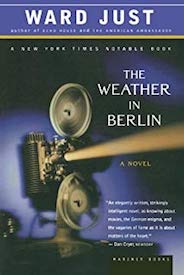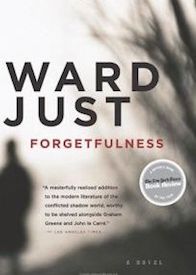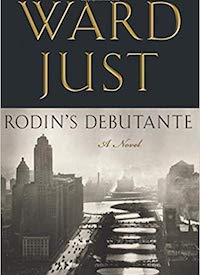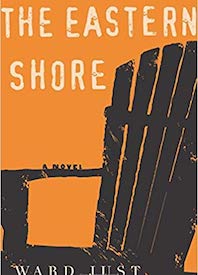
Why America’s Best Political Novelist Is Required Reading in 2018
On the Prescience of Ward Just
When Brett Kavanaugh was confirmed, I imagine that I was one of many women who regretted that I couldn’t join the protests in Washington, D.C. In a strange way, I wanted to get arrested, as if only that degree of rebellion would express my rage and despair.
As a writer, I’ve always been more comfortable parsing complex ideas on paper rather than sloganeering in the streets. But these are not ordinary times; they are, as the man said, times that try men’s souls, and certainly women’s. People on all sides of our tribal clash are united by a sense of shock as we watch America follow the playbook of failed states. This is not supposed to happen in America.
One writer foretold it all. Ward Just has been writing books for nearly fifty years, producing nineteen novels, four story collections, and two nonfiction accounts of the Vietnam War. He writes about power and men and women, but in some essential way, all the stories are about the no holds barred fight between the old order and the new.
I’ll just say it. Ward Just is not merely America’s best political novelist. He is America’s greatest living novelist. To our discredit, he’s also America’s Greatest Unknown Novelist.
Ward Just had the misfortune to write political novels at a time when they were out of fashion. American writers long ago ceded the ground to international authors: Chimamanda Ngozi Adichie, Kamila Shamsie, Gaël Faye. As a result, both our artistic and political lives have suffered.
Just, who recently turned 84, is from a generation that never fell prey to the illusion that any individual could be immune to history. In the underrated tradition of journalists-turned-novelists, Just covered the Vietnam War for the Washington Post from 1967 to 1969. As Tim Weiner wrote for the Post: “In June 1966, Mr. Just was seriously wounded by a grenade while covering a patrol in the Central Highlands. Vietnam was no metaphor for him; the shrapnel still sometimes rises to the surface of his body. Healed, he went back to Vietnam as a Post reporter, but found it hard to convey the awful futility of the war in a factual way.” In an echo of Senator John McCain, Just refused to be airlifted out until the wounded infantrymen he was covering had been brought to safety.
After leaving the Post—editor Ben Bradlee reportedly was not happy—Just peeled off two nonfiction books about Vietnam before turning to fiction. White, male, and lucky enough to have family money from his father’s newspaper business in Waukegan, Illinois, 40 miles outside Chicago, Just could afford to ignore literary fashion. These days, if he were more well-known, he would undoubtedly have the word “privilege” thrust upon him. But it is worth noting that, unlike mid-century Great American Novel guys whose sexism can be a dealbreaker for contemporary women readers, Just has always seen women as people: strong, complicated, ambitious, rife with their own pleasures and tragedies. In the early novels and stories, which mostly take place in the Kennedy years, the tension between strong-willed female characters and the strictures of their society is reminiscent of the great 19th-century novels.
In the City of Fear (1982) is the story of a romantic triangle, but hardly the usual one. Marina Piatt is caught between her congressman husband, and her lover, Sam Warden, an infantry colonel grappling with the memories of a badly conceived and illegitimate plot to win the war in Vietnam. Just’s great strength as a novelist is setting up parallels between the personal dilemmas of his character and their public lives. As one critic wrote, this novel examines the “trap of claustrophobic power as both Sam and Piatt have too much power, and yet still have too little power to take any truly decisive action.”
What makes these books so valuable is that Just’s characters are not mere witnesses to history; they are participants. As I went back to Just’s books, I imagined Brett Kavanaugh as a Just character. Like Kavanaugh, many of Just’s characters come from politically connected families. They go to good schools. They spend summers at country clubs. The way is paved, the expectations high.
In fiction as in life, the characters’ lives become complicated in ways that neither Exeter nor the country club prepared them to deal with; not even Yale.
![]()
Two of Just’s novels evoke the Washington milieu of Georgetown Prep and the Holton Arms School with nuanced precision. Echo House (1997), a National Book Award finalist, shows the culture that formed Kavanaugh and his schoolmates: the striving, the high-stakes gambling for electoral and political victory, the incessant hum of power and reminders of one’s own inadequacies.
While the Washington novels are essential reading, the rage of these sons of privilege is rendered most starkly in The American Ambassador, published in 1986. A riff on the Henry James’ The Ambassadors, the book is about an American diplomat who travels to Berlin to persuade his son to leave a German terrorist group. Just’s protagonist, the aptly named Bill North, is more sophisticated than his predecessors, yet he has taken questionable measures to secure the post-World War II order. In Germany, “the place where modern history began” his son ultimately commits patricide. John North’s son, educated, well-loved, is possessed by an unforgiving rage that lies coiled beneath lives stretched tight by decorum, the private world that, like the public one, is controlled at considerable cost.
“What makes these books so valuable is that Just’s characters are not mere witnesses to history; they are participants.”
In Echo House, nominated for a National Book Award, the children of Washington, D.C. are irretrievably damaged, but in this novel, the wounded aspects of their personality ensure their success. The book opens with a dinner party organized by Constance and Senator Adolph Behl that is supposed to be the setting for a triumphant announcement: the senator has been promised a run at the vice-presidency.
When the phone call comes, Behl is silent, “like a classroom lecturer who has unaccountably lost his place and had forgotten what came next.” The Alabama delegation, it seems, was not sewn up. The candidate chose a different running mate. Shifting the whiskey glass from his left hand to his right, he hurls it at the wall. Later, the family will cover the defect with a Picasso.
“You nudge fate; you put yourself in the hunt,” Behl’s wife, Constance, had mused earlier in the day. Now the candidate has done his own math. That is the game; everyone knows the rules.
You nudge fate. Isn’t this what Kavanaugh did when he allegedly contacted Yale classmates to quash reports that he had exposed himself to fellow student Deborah Ramirez? Isn’t it what White House counsel Don McGahn did, if news reports are accurate, when he told Donald Trump to hang tough on limiting the FBI’s investigation of Kavanaugh despite the damage caused by subverting the rule of law? I have a political consultant friend who has always worked for Democrats. The good guys, supposedly. He never talks about long-term consequences. He talks about winning.
Covering defects, even with a Picasso, may breed success, but in Echo House it does not lead to happiness. Axel, the congressman’s son, becomes Washington’s pre-eminent fixer. His marriage to a European poet founders on his adherence to the Washington code, yet he cannot break free; the family trade is too deeply ingrained. Government, as one character muses, is “the opiate of the patrician masses.”
What Axel gains from proximity to power is a bitter kind of knowledge. During his military service in World War II, the prematurely worldly congressman’s son tosses off a remark that offers the most profound insight into Donald Trump that I’ve heard in a mere six words.
“What’s propaganda?” the boy asked.
“A rhapsody,” Axel said. “A bully’s love song.”
![]()
Art imitates current events mostly closely in 2011’s Rodin’s Debutante, a novel that hinges on a sadistic rape. The novel begins with a character sketch of a rich, brutish man reminiscent of The Great Gatsby’s Tom Buchanan who decides to found a boys’ school largely to spite his wife and father. His idea is to rival the Eastern schools, providing to Midwestern boys, “the many valuable friendships one forms in boarding school, friendships that last a lifetime, boys helping one another as they moved onward in life, in business and so forth.”
After this prologue, the reader is introduced to the book’s protagonist. Lee is the son of a judge and as a boy, he is tangentially involved in two events that mar the Midwestern town that his father wants to keep intact, a “fine place to grow up in.” One is the death of a tramp; the other is the traumatic rape of Magda, one of Lee’s classmates. Half-Puerto Rican and half-Serbian, Magda is a girl with brown skin and blue eyes, someone Lee has helped with quadratic equations.
Much of the novel hinges on a conversation Lee overhears between the town’s power brokers. Magda is in shock, unable to speak or identify her accuser. As an adult, she will be unable to access her memories of the event, which has transformed her from a chubby, good-natured girl to a thin, religious woman unable to form romantic attachments.
The only suspect is her high school boyfriend, the son of a prominent lawyer. He seems genuinely harmless, “not at all the sort of boy to be involved.” The tramp who might have been implicated has already died. As Lee eavesdrops, he hears his father convince the town fathers to drop the case. The police chief already knows that it’s his job to let bygones be bygones; it’s a lesson he was taught soon after his arrival. The town banker will ensure that Magda and her mother receive financial help. The newspaper publisher argues for coverage that might help authorities find the rapist. In the end, he is persuaded to run only the most anodyne of stories.
Just’s father was a newspaper editor and publisher in Waukegan, Illinois, about 30 miles outside Chicago. While his books are not, per se, autobiographical, he has an intimate understanding of how powerful men conspire to change details and appearances for public consumption as a strategy to retain power. There is even a phrase for it: “transformation and preservation” coined by Yale law professor Riva Siegel.
One needs look no further than Just’s description of the town fathers “handling” the awkward solecism in the town’s life to understand what just happened in America. The most serious problem, to my mind, was not Christine Blasey-Ford’s sexual assault accusation, but the hijacking of the confirmation process: the refusal to release 100,000 pages of documents, the failure to call witnesses, the meaningless, truncated FBI investigation.
The primal power struggle between men and women lies underneath these constitutional issues. In Rodin’s Debutante, the oppression of women, even when undertaken humanely, is central to reaffirming the traditional power structure. This is politics, too: in the aggregate, most women hold values different from men’s, and if women are activated, their sheer numbers pose a threat.
Perhaps the next chapter in our history can also be found in these pages. Despite the understated tone of Just’s prose, there is a hint of the gothic that foretells destruction and renewal. Years later, Magda returns to New Jesper as an adult, trying to trigger her memory, as if hoping that she can right her life by reassembling the lost part of it, however painful. “I thought it was my fault. I had done something, said something, I don’t know what. I had brought this terrible thing on myself, yet I had no memory of it,” she tells Lee. As an adult, he is acutely aware of the class differences that existed in high school, and how these have carried through in the starkly different trajectories of their lives.
The book’s conclusion knits together the seemingly disparate characters in a fire that destroys the boy’s school and all it represents. Trying to hold back history only increases its toll, Just seems to suggest.
Like many of the insights in Just’s books, it is an important lesson for the Senate’s Lords of Yesterday, but one they are unlikely to learn.
![]()
Essential Writing by Ward Just

The American Ambassador (1987)
The fraught story of a conflict between father and son turns on the question of the guilt associated with empire-building, and the vulnerability of rational people when faced with nihilistic rage.

The Weather in Berlin (2002)
A dreamlike account of an American director who returns to Germany, the setting of his career-making film, where he tries to reconcile the past: his history as a director who controlled the lives of his actors and that of a nation emerging from totalitarianism.

Forgetfulness (2006)
In this perfectly crafted novel, Just assesses and reassesses America’s terms of engagement with the post 9/11 world, in which a terrorist chides a CIA operative: “You are a restless people, you Americans. You expect others to clean up for you.”

Rodin’s Debutante (2011)
Writers Antonya Nelson and Robert Boswell talk about the “shape” of a story, and Rodin’s Debutante embodies that notion, the story of a young man coming of age in the Midwest that breaks the rules of traditional narration yet makes superb emotional sense.

The Eastern Shore (2016)
A sentimental favorite that’s a love song and an epitaph for journalism and journalists (“people with short attention spans who like to keep their distance” as Just said in an interview) as well as an exegesis of fact versus fiction. An objective observer might substitute Jack Gance (1989) about a Chicago boy who incrementally gets dirty as he becomes a success in politics, or A Dangerous Friend (1999) set in 1965, the pivotal time when the U.S. could have backed off its commitment to the war.
Susan Zakin
Susan Zakin is the author of Coyotes and Town Dogs: Earth First! and the Environmental Movement and editor of the anthology Naked: Writers Uncover the Way We Live on Earth. Her writing has appeared in Vogue, Salon, Mother Jones, Sierra, The New York Times, The Los Angeles Times, The Christian Science Monitor, High Country News, Field and Stream and others.



















